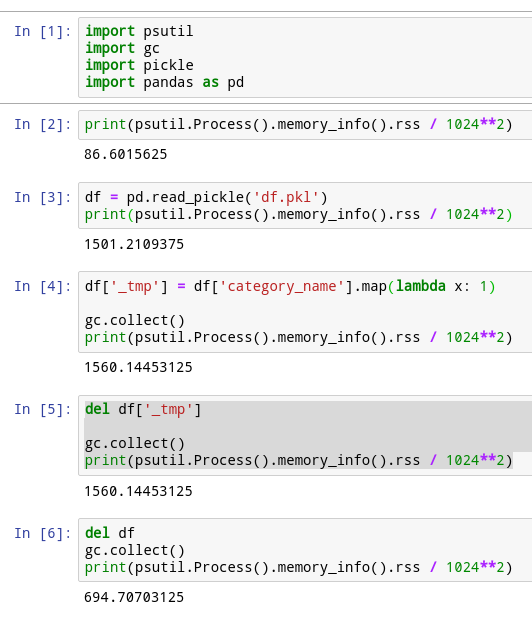-
-
Notifications
You must be signed in to change notification settings - Fork 18.4k
New issue
Have a question about this project? Sign up for a free GitHub account to open an issue and contact its maintainers and the community.
By clicking “Sign up for GitHub”, you agree to our terms of service and privacy statement. We’ll occasionally send you account related emails.
Already on GitHub? Sign in to your account
Memory leak in pd.read_csv or DataFrame #21353
Comments
|
@kuraga : Thanks for the updated issue! |
|
I have a similiar issue. I have tried to debug it with memory_profiler but I don't see the source of the leak. This snippet of the code is inside a loop and every time it increments the memory usage. I also tried to delete the history and history_group object and calling gc.collect() manually, but nothing seems to work. p.s: My pandas version is 0.23.1 |
|
Sorry, I was wrong. Not the read_csv which consumes the memory rather than a drop: And I think I found out that malloc_trim solves the problem, similar to this: #2659 @kuraga Maybe you should try it. |
|
I also noticed a memory leak in @gfyoung, could you please review the patch below? It might also help with the leak discussed here, although I am not sure if it is the same leak or not. The patch
--- parsers.pyx 2018-08-01 19:57:16.000000000 +0100
+++ parsers.pyx 2018-10-08 15:25:32.124526087 +0100
@@ -1054,18 +1054,6 @@
conv = self._get_converter(i, name)
- # XXX
- na_flist = set()
- if self.na_filter:
- na_list, na_flist = self._get_na_list(i, name)
- if na_list is None:
- na_filter = 0
- else:
- na_filter = 1
- na_hashset = kset_from_list(na_list)
- else:
- na_filter = 0
-
col_dtype = None
if self.dtype is not None:
if isinstance(self.dtype, dict):
@@ -1090,13 +1078,26 @@
self.c_encoding)
continue
- # Should return as the desired dtype (inferred or specified)
- col_res, na_count = self._convert_tokens(
- i, start, end, name, na_filter, na_hashset,
- na_flist, col_dtype)
+ # XXX
+ na_flist = set()
+ if self.na_filter:
+ na_list, na_flist = self._get_na_list(i, name)
+ if na_list is None:
+ na_filter = 0
+ else:
+ na_filter = 1
+ na_hashset = kset_from_list(na_list)
+ else:
+ na_filter = 0
- if na_filter:
- self._free_na_set(na_hashset)
+ try:
+ # Should return as the desired dtype (inferred or specified)
+ col_res, na_count = self._convert_tokens(
+ i, start, end, name, na_filter, na_hashset,
+ na_flist, col_dtype)
+ finally:
+ if na_filter:
+ self._free_na_set(na_hashset)
if upcast_na and na_count > 0:
col_res = _maybe_upcast(col_res)
@@ -2043,6 +2044,7 @@
# None creeps in sometimes, which isn't possible here
if not PyBytes_Check(val):
+ kh_destroy_str(table)
raise ValueError('Must be all encoded bytes')
k = kh_put_str(table, PyBytes_AsString(val), &ret) |
|
@zhezherun : That's a good catch! Create a PR, and we can review. |
|
Trying to patch is cool but fear that #2659 (comment)... |
* Move allocation of na_hashset down to avoid a leak on continue * Delete na_hashset if there is an exception * Clean up table before raising an exception Closes pandas-devgh-21353.
* Move allocation of na_hashset down to avoid a leak on continue * Delete na_hashset if there is an exception * Clean up table before raising an exception Closes pandas-devgh-21353.
* Move allocation of na_hashset down to avoid a leak on continue * Delete na_hashset if there is an exception * Clean up table before raising an exception Closes gh-21353.
|
@zhezherun , @TomAugspurger , thanks very much! But could you, please, describe the connection with @nynorbert 's observation:
So, we had memory leak in Pandas in addition to glibc's feature to not trim after Thanks. |
|
I don't know C, so no. Perhaps @nynorbert can clarify. |
* Move allocation of na_hashset down to avoid a leak on continue * Delete na_hashset if there is an exception * Clean up table before raising an exception Closes pandas-devgh-21353.
* Move allocation of na_hashset down to avoid a leak on continue * Delete na_hashset if there is an exception * Clean up table before raising an exception Closes pandas-devgh-21353.
|
|
|
Hi, I am facing this issue on google compute engine (Windows Server 2012 R2 Datacenter, 64 bit). How do I fix it? I have installed the latest version of Pandas. |
|
Theory: When reading large files with Python, pd.read_csv, csv.reader, plain python io, or with mmap it seems that the thread reading will hold memory. If the same thread does a new read, the already allocated memory will be used, if a new thread reads, it will aquire additional memory. With panda on google the reading of 3 files of app. 100 MB has required app 3GB that is not released. With csv.reader app 300MB, and plain read and mmap app 200MB. So multithreading read of the 3 files can result in extensive storage use (25GB+). This is not my home field, but it has been a frustrating week looking for leaks. If I'm wrong, sorry for the disturbance. (Python 3.7 and 3.8) |
|
@gberth If you use engine="python" do you see that same pattern? |
|
Sorry, no difference. If I ensure reading files twice in the same thread, it does not consume or hold more memory. Read in two different threads, and both holds 2GB+ as long as the threads live (at least looks like that to me) |

Code Sample, a copy-pastable example if possible
Problem description
Two issues:
pd.DataFrame()- ~53Mb.cc @gfyoung
Output of
pd.show_versions()(same for 0.21, 0.22, 0.23)
The text was updated successfully, but these errors were encountered: